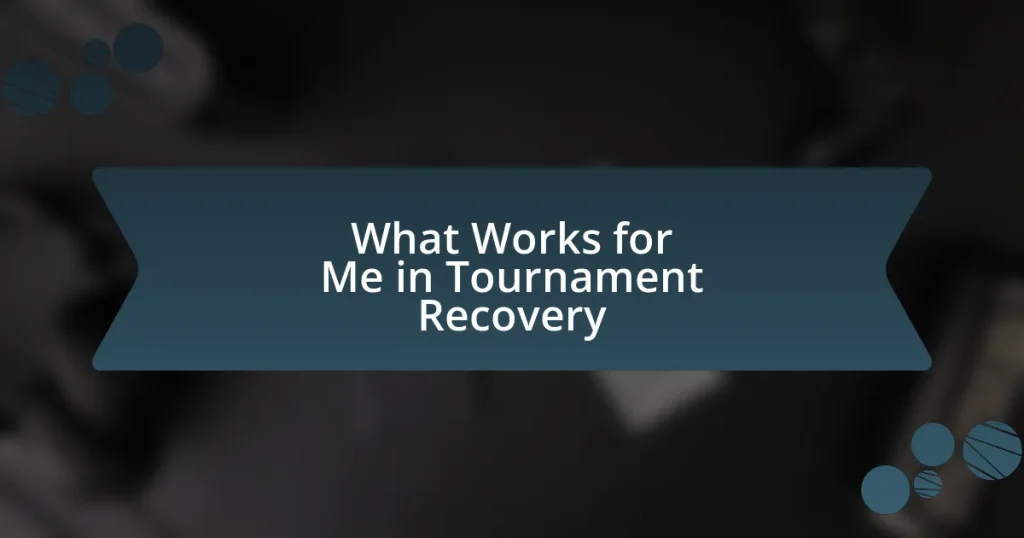Key takeaways:
- Structured recovery routines, including hydration, sleep, and nutrition, are vital for optimal tournament recovery.
- Incorporating active recovery and mobility drills, like light activities and stretching, enhances physical recovery and performance.
- Mental recovery practices such as mindfulness, visualization, and journaling are crucial for overall athlete performance and growth.
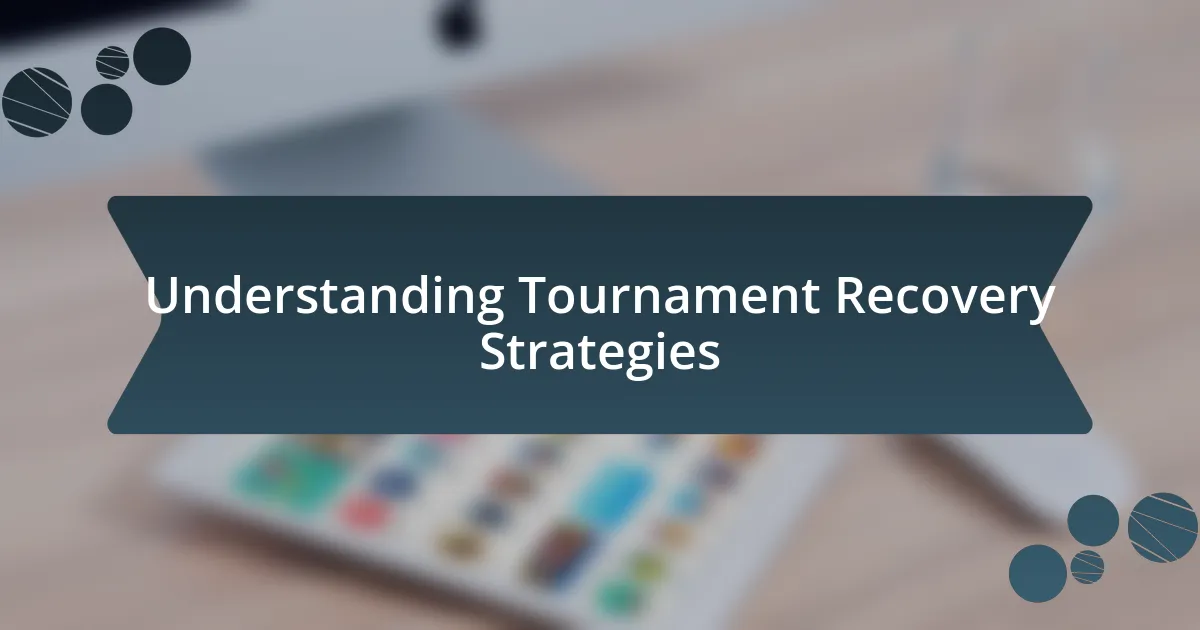
Understanding Tournament Recovery Strategies
When it comes to tournament recovery strategies, I often reflect on the importance of a structured routine. After a long tournament day, I found that taking time to unwind and process the events was as crucial as any physical recovery strategy. Have you ever felt that overwhelming sense of fatigue wash over you after an intense competition? Developing a post-tournament checklist helped me stay focused and in control.
Hydration is another pillar of my recovery strategy. I remember a time when I overlooked this simple yet critical element, which left me feeling drained for days after the tournament. It’s fascinating how something as basic as drinking water can significantly impact your energy levels and performance in subsequent events, don’t you think? I always carry a reusable water bottle with me now, ensuring I’m consistently replenished.
Additionally, I’ve learned the value of active recovery while reflecting on my past experiences. Instead of opting for complete rest after a tournament, I find that engaging in light activities like yoga or a brisk walk helps me shake off the soreness. Have you noticed how movement can truly elevate your mood and speed up recovery? Balancing relaxation with gentle activity has become a cornerstone of my post-tournament efforts.
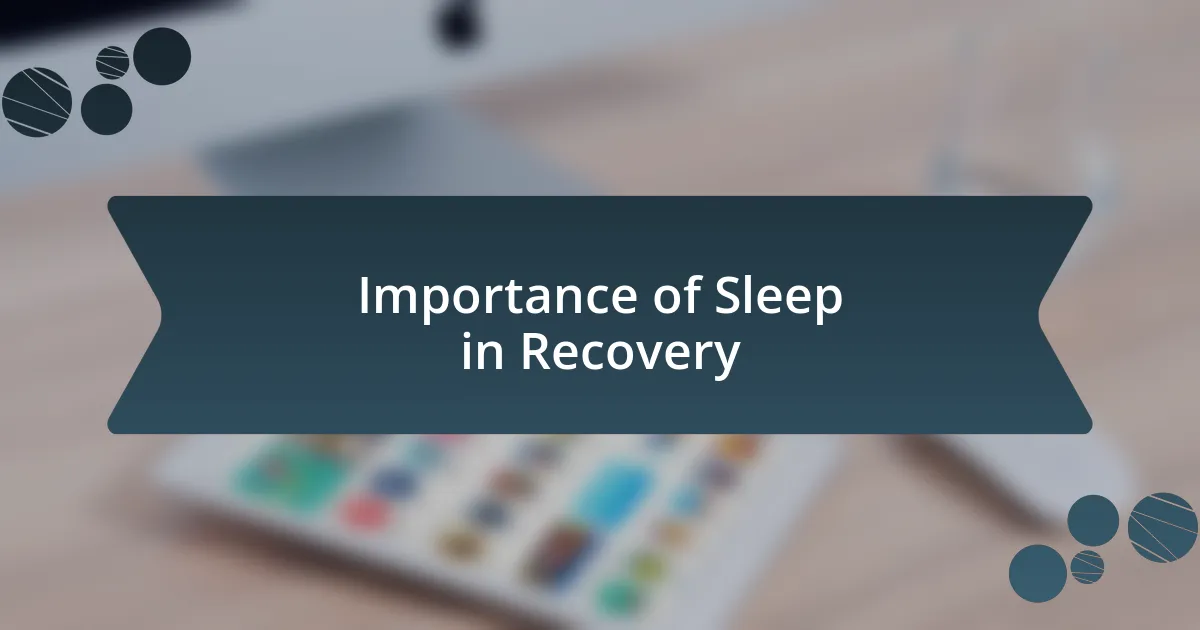
Importance of Sleep in Recovery
Sleep is often the unsung hero of recovery. I remember one tournament where I pushed myself late into the night, replaying every match in my mind instead of resting. The next day, I felt like a zombie, struggling to focus and perform. From that experience, I realized that quality sleep is essential for cognitive function and physical recovery. Without it, I was simply not in my best shape.
In my journey, I’ve discovered that it’s not just about the hours you spend in bed but also the quality of that sleep. I’ve started creating an environment conducive to rest—dimming lights, minimizing noise, and putting away devices. It’s interesting how these small adjustments can lead to deeper, more restorative sleep. Have you ever paid attention to how your sleep environment impacts your recovery? I know now that prioritizing sleep can transform my performance, leaving me feeling refreshed and ready for the next challenge.
Lastly, recovery sleep helps in muscle repair, which is critical after exerting myself during tournaments. After discovering this connection, I’ve made it a point to allow myself adequate rest periods, not just when I’m exhausted but as a proactive strategy. I’ve seen incredible improvements in my recovery time, and I genuinely believe it enhances my overall well-being. It’s fascinating how something so seemingly simple can have such profound effects, isn’t it?
| Factor | Impact on Recovery |
|---|---|
| Quality of Sleep | Enhances cognitive function and muscle repair |
| Sleep Environment | Affects sleep depth and restoration |
| Sleep Duration | Critical for full recovery after tournaments |
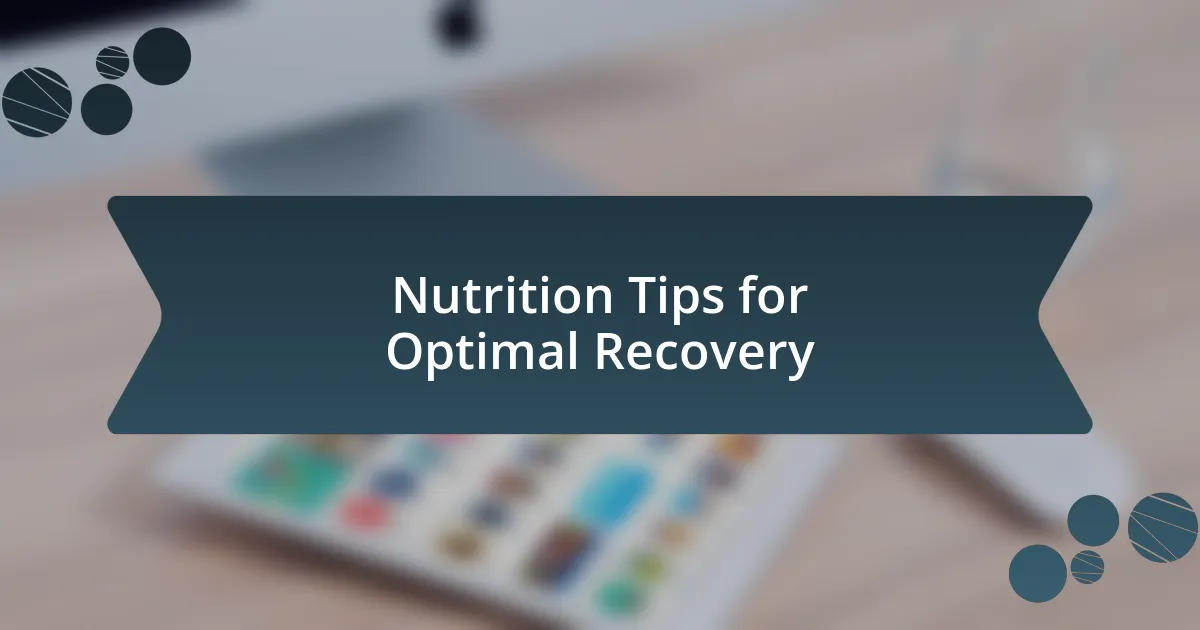
Nutrition Tips for Optimal Recovery
Nutrition plays a critical role in how well we recover after rigorous competition. I recall a tournament where I treated my diet casually, opting for quick convenience foods that left me feeling sluggish. After reflecting on my performance, I realized that a well-planned recovery nutrition strategy can significantly enhance my energy levels and overall recovery. For me, prioritizing nutrient-dense foods has become a game-changer.
Here are some nutrition tips that I’ve found effective for optimal recovery:
- Hydration: Start rehydrating immediately after your event to replenish lost fluids and electrolytes.
- Protein Intake: Aim for a high-quality protein source within 30 minutes post-competition to support muscle repair; I often go for a whey protein shake or grilled chicken.
- Carbohydrates: Don’t shy away from carbs—they refill your energy reserves. I enjoy a banana or sweet potato for an easy energy boost.
- Healthy Fats: Incorporating sources like avocados or nuts helps reduce inflammation.
- Vitamins and Minerals: Focus on colorful fruits and vegetables; they provide essential nutrients and antioxidants that aid recovery.
- Timing Matters: I’ve learned that spreading these meals into smaller portions throughout the day keeps my energy steady.
In my experience, aligning nutrition with my recovery goals has transformed how I feel both physically and mentally. After making these adjustments, I noticed a marked difference in my stamina during tournaments and less muscle soreness afterward. It’s empowering to realize that what I fuel my body with can directly impact my performance—something I wish I had understood earlier in my journey.
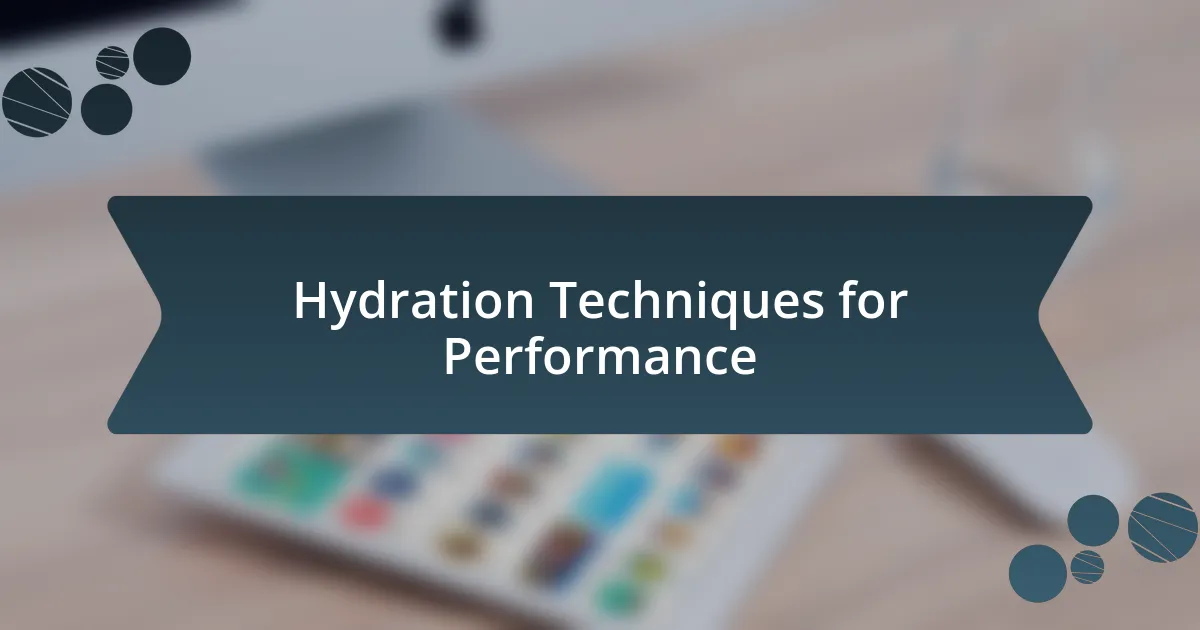
Hydration Techniques for Performance
One hydration technique that I’ve found essential is to carry a water bottle with me at all times. I remember a tournament where I got so caught up in the competition that I neglected my fluid intake, and by the end of the day, I felt utterly drained. It’s fascinating how simple it is to prevent that fatigue; just keeping water accessible reminds me to sip regularly, which helps maintain my energy levels.
Incorporating electrolyte drinks into my routine has also made a significant difference. After a particularly grueling match, I opted for a coconut water instead of my usual sports drink, thinking it was a healthier choice. To my surprise, I felt more refreshed and rehydrated than I had in previous competitions. I started to wonder—could the right balance of electrolytes truly enhance recovery? From that moment, I became intentional about selecting my hydration sources based on the quality of ingredients, realizing that not all hydration is created equal.
Another technique I’ve embraced is timing my hydration around competitions. I’ve discovered that drinking water in smaller, consistent amounts throughout the day works better than chugging large quantities before my events. I recall one moment where I felt invincible during a game because I was adequately hydrated—not just physically, but mentally sharp. It struck me that hydration isn’t just about quenching thirst; it’s about optimizing performance and feeling strong in the moments that matter most.
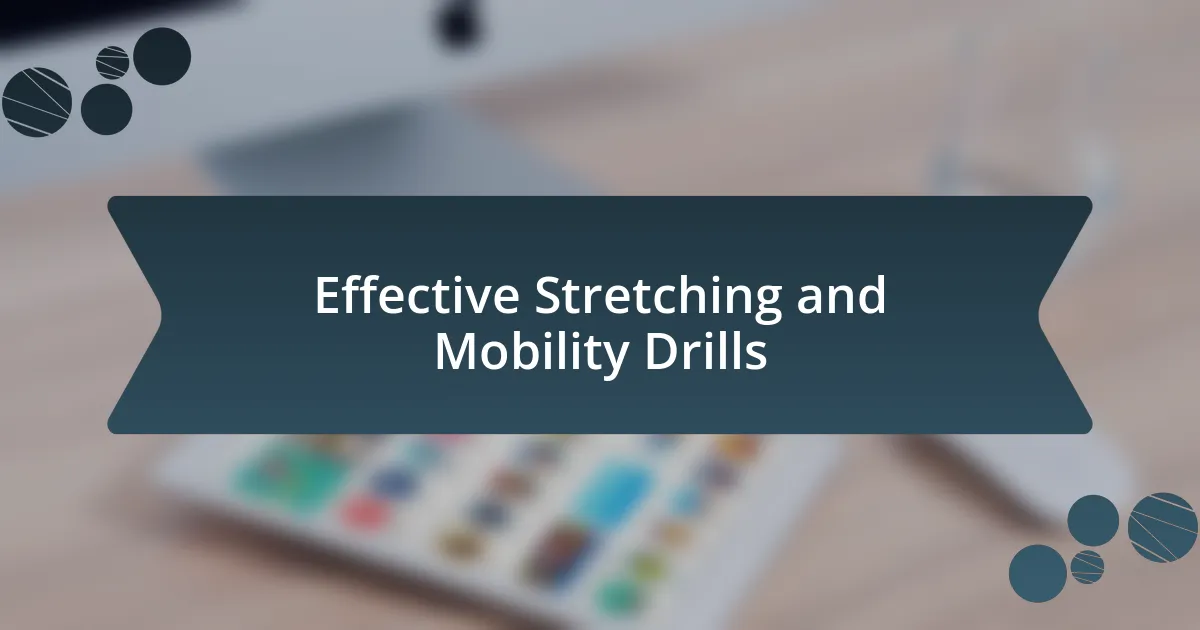
Effective Stretching and Mobility Drills
Effective Stretching and Mobility Drills
When it comes to recovery, I can’t stress enough the importance of incorporating effective stretching and mobility drills into my routine. I remember a particularly intense tournament where I felt tightness creeping into my muscles between matches. It was at that moment I decided to prioritize dynamic stretches, like leg swings and arm circles, which not only increased my range of motion but also helped keep me mentally focused. How amazing is it that a few minutes of movement can make such a difference?
One drill that has become a staple for me is the hip flexor stretch; it’s incredible how much more dynamic my movements feel afterwards. During a recent tournament, I noticed a dramatic improvement in my agility after taking the time to open up my hips. By holding that stretch for at least 30 seconds on each side, I really felt my body responding, as if it were thanking me for the care I was giving it. Isn’t it fascinating how our bodies communicate their needs?
I also turn to foam rolling as an effective tool for releasing tension built up during intense competition. The first time I rolled out my legs after a hard-fought match, it was as if I had discovered a whole new level of recovery. With each pass of the foam roller over sore muscles, I felt relief wash over me, and I often ask myself—why didn’t I adopt this practice sooner? Having that immediate feedback from my body has truly transformed my approach to recovery, making it an integral part of my post-tournament routine.

Mental Recovery Practices for Athletes
Mental recovery is just as crucial as physical recovery for athletes, and I’ve found that mindfulness practices can significantly enhance my overall performance. After a demanding tournament, I often take the time to sit quietly and focus on my breath, allowing my mind to detach from the competitive energy. It’s surprising how just a few minutes of mindfulness can clear my head and help me reflect on my experiences—has anyone else experienced that moment of clarity after a hard day of competition?
Moreover, I’ve embraced visualization techniques that allow me to mentally rehearse my skills and strategies. Before competitions, I often close my eyes and picture myself executing each move flawlessly, feeling the confidence build within me. This practice has helped me stay calm and focused, especially in high-pressure situations. I remember one time, before a crucial match, my mind was racing with doubts, and using visualization pulled me back into a state of control—how powerful is that?
Lastly, I find journaling to be an incredibly effective way to process my thoughts and emotions after tournaments. Writing down my experiences helps me understand what worked, what didn’t, and how I felt throughout the competition. There’s something cathartic about reflecting on my journey in ink; it creates a narrative that I can revisit and learn from later. Have you ever tried writing about your athletic experiences? It can truly open up new perspectives and foster personal growth.

Creating a Personalized Recovery Plan
Creating a Personalized Recovery Plan involves understanding your unique needs and preferences. For me, incorporating active recovery days into my routine has been a game changer. I’ve learned that light activities like yoga or leisure swimming not only help alleviate muscle soreness but also allow me to recharge mentally. Have you ever noticed how much better you feel after moving your body gently instead of just sitting still?
Another crucial aspect of my recovery plan is nutrition. After tournaments, I make it a point to refuel with nutrient-dense foods that support muscle repair and overall well-being. For instance, I often enjoy a smoothie loaded with greens, protein, and healthy fats, which I find rejuvenating after a long day of competition. How does your body feel different when you prioritize the right foods for recovery?
Lastly, sleep cannot be overlooked in my plan. I’ve experienced firsthand how a good night’s rest can affect my performance. Each time I prioritize my sleep following a tournament, I wake up feeling more energized and ready to tackle my training. I sometimes wonder if we’ve underestimated the power of simply resting well. Have you found a sleep routine that works for you? It’s one of those foundational elements that truly makes a difference in recovery.











